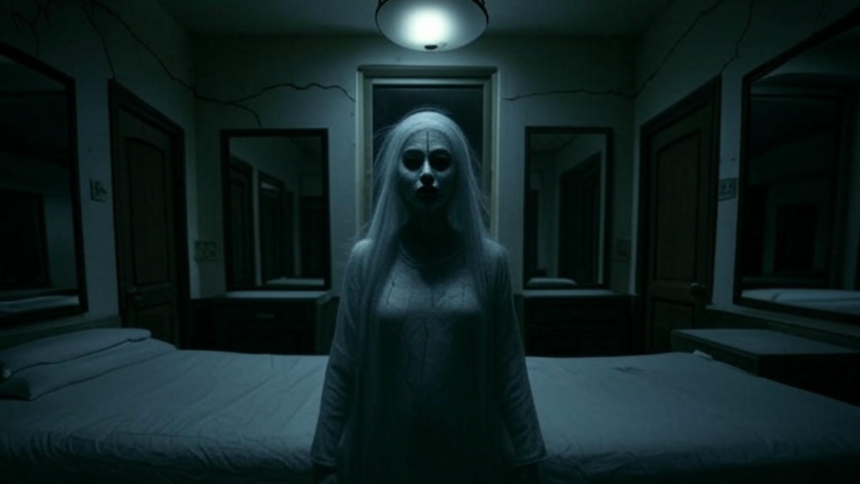Khauf, a 2025 Indian horror series streaming on Amazon Prime Video, has emerged as a compelling addition to the genre, blending supernatural terror with a raw exploration of societal issues. Directed by Pankaj Kumar and Surya Balakrishnan, and written by Smita Singh, the series premiered on April 18, 2025, and quickly garnered attention for its atmospheric dread and thought-provoking themes. Starring Monika Panwar as Madhu, alongside Rajat Kapoor, Geetanjali Kulkarni, and Shilpa Shukla, Khauf delves into the horrors of patriarchy, trauma, and survival, set against the eerie backdrop of a Delhi women’s hostel. With eight episodes totaling around six hours, the series offers a slow-burn narrative that prioritizes psychological depth over cheap scares.
Plot and Themes
The story follows Madhu, a young woman from Gwalior, who moves to Delhi seeking a fresh start after surviving a sexual assault. She checks into Room 333 at Pragati Women’s Hostel, a dilapidated building harboring a sinister history. The room’s previous occupant died under mysterious circumstances, and the other residents—played by Priyanka Setia, Chum Darang, Riya Shukla, and Suchi Malhotra—warn Madhu to leave before it’s too late. As Madhu grapples with her past trauma, she encounters inexplicable forces that blur the line between the supernatural and her own fractured psyche. Parallel to her story, a hakim (Rajat Kapoor) in Old Delhi preys on vulnerable women, adding a layer of real-world horror to the supernatural elements.
Khauf isn’t just about ghosts; it’s a metaphor for the pervasive fear women face daily. The series uses horror to explore themes of patriarchal violence, gaslighting, and the lasting impact of trauma. Delhi itself becomes a character, its streets and buses laden with the threat of gendered violence—a nod to real-world events like the 2012 Delhi gang rape that reshaped India’s discourse on women’s safety. The hostel’s oppressive atmosphere mirrors the societal constraints women endure, with cracked walls and covered mirrors symbolizing unprocessed trauma. As Madhu’s rage and fear manifest, the series questions whether the true horror lies in the supernatural or in the systemic cruelty women face.
Performances and Direction
Monika Panwar delivers a tour-de-force performance as Madhu, capturing the character’s vulnerability and resilience with nuance. Her portrayal of Madhu’s psychological unraveling—especially during possession scenes—is chilling, conveying more through her expressions than dialogue. Rajat Kapoor brings a menacing gravitas to the hakim, though some critics argue his role lacks narrative justification, feeling more like a trope than a fully realized character. Geetanjali Kulkarni shines as an alcoholic cop searching for her missing son, while Shalini Vatsa’s turn as the hostel warden, Gracie Dungdung, adds a layer of stern yet protective warmth. The ensemble cast, including Shilpa Shukla’s impactful cameo as Dr. Shohini, elevates the series with their authentic portrayals of women bound by shared trauma.
Directors Pankaj Kumar and Surya Balakrishnan create a visually striking series, with cinematography that transforms the hostel into a living, breathing entity. The camera lingers on claustrophobic spaces, using shadows and silence to build dread. The sound design is meticulous, amplifying the tension without relying on jump scares. However, the pacing falters at times, with some episodes feeling overly drawn out. The series’ ambition to blend supernatural horror with socio-psychological realism leads to tonal inconsistencies, particularly in the final episodes, where the horror thread feels sidelined for emotional resolution.
Reception and Impact
Khauf has received largely positive reviews, earning a 7.6/10 on IMDb and ratings averaging 3 to 3.5 out of 5 from critics. Monika Panwar’s performance has been universally praised, with many calling it the heart of the series. Critics appreciate the show’s thematic depth, with publications like The Hindu calling it a “masterpiece in female-centric horror” for its unflinching look at women’s struggles. However, the ambiguous ending and uneven pacing have drawn criticism. Some viewers on X have hailed it as a “haunting revelation,” while others find the lack of closure unsatisfying, questioning unanswered plot points like the hakim’s true significance.
Conclusion
Khauf stands out as a bold entry in Indian horror, using the genre to confront real-world fears faced by women. While it doesn’t always balance its supernatural and psychological elements, its compelling performances and atmospheric tension make it a worthwhile watch. For those who appreciate horror with a social conscience, Khauf offers a chilling, thought-provoking experience that lingers long after the credits roll.





